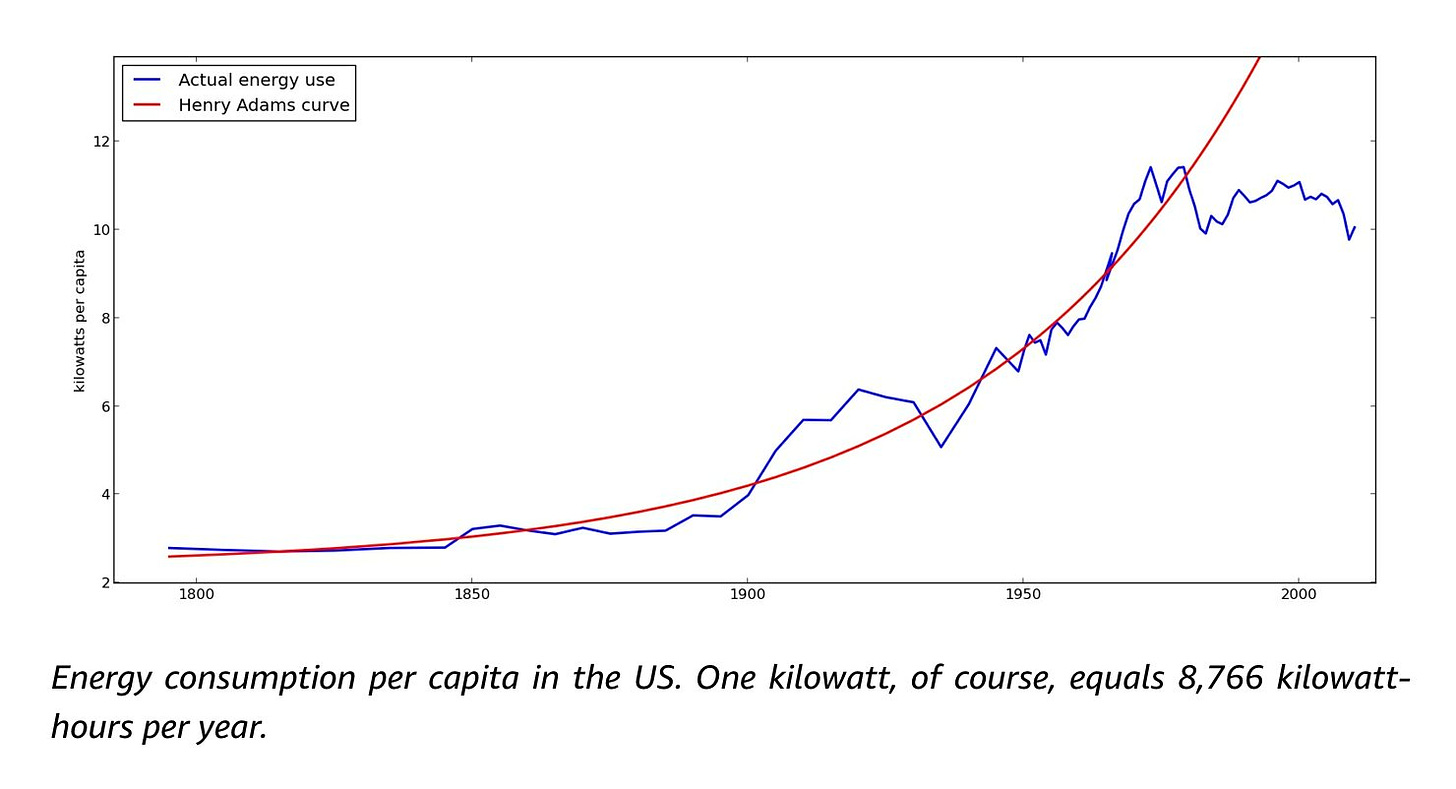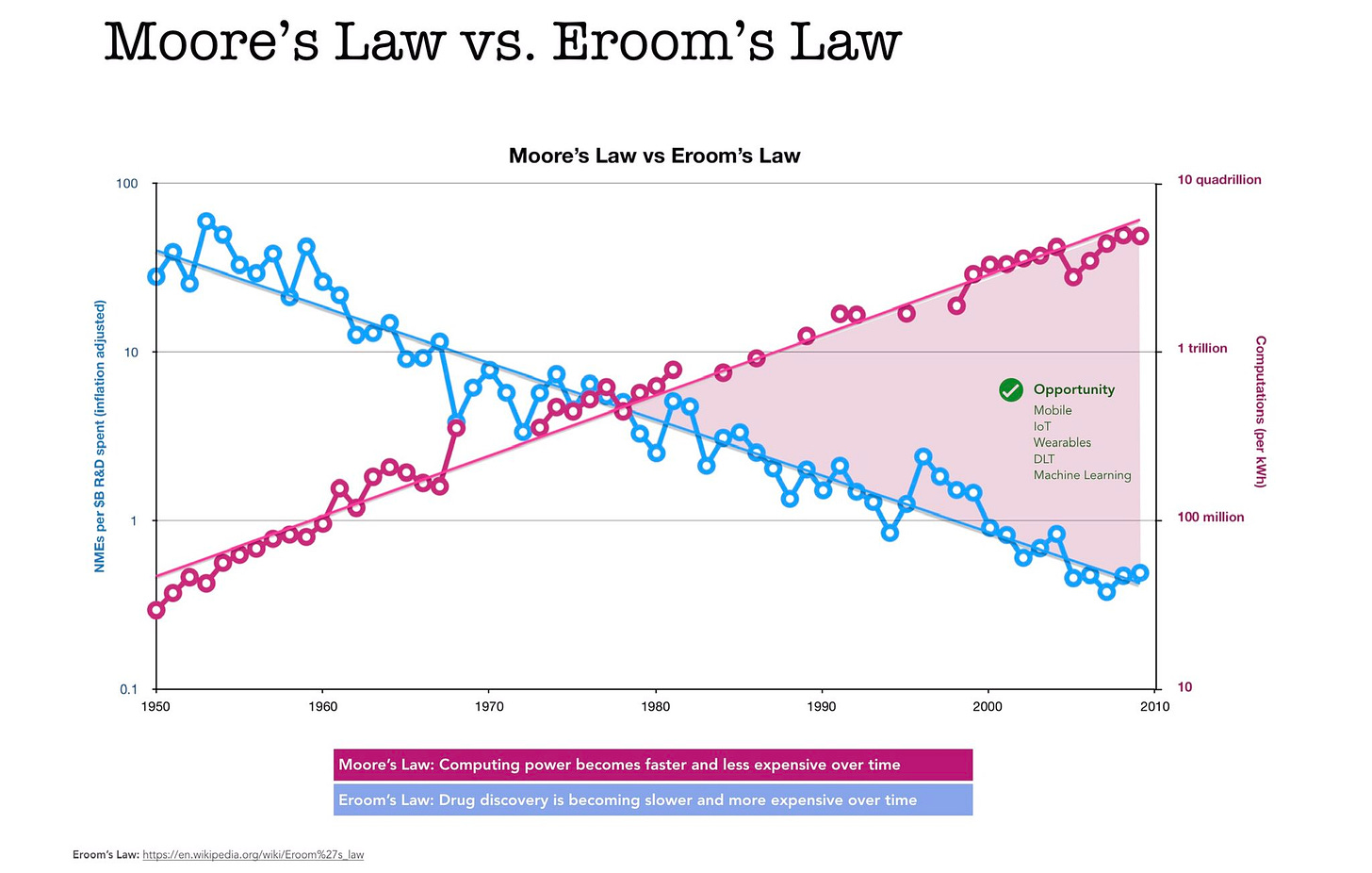1-Sentence Version
Infinita supports founders overcoming regulatory bottlenecks through startup cities, network states, and crypto rails, to unleash a new wave of technological progress.
1-Paragraph Version
The world has progressed rapidly in the world of bits, but not in the world of atoms. What’s holding back technological progress are outdated legal guardrails. Legal & governance innovation, however, is on the horizon, which creates new possibilities for startups to disrupt sclerotic industries through biotechnology, hardware and the blockchain-powered digital asset revolution. Infinita aims to supercharge this movement, by helping founders utilize startup cities, network states, and crypto rails.
Full Version
Technology is capable of steering human progress toward unimaginable heights.
Moore's Law has powered innovation in the digital world. Yet, progress in the material world seems to be stagnating.
Hard as it seems to believe, despite personal computing the past two decades have been a stagnant period when it comes to productive economic growth.
A potential cause of this is stagnation in energy usage, which coincided with progress in the material-technological sectors (Henry Adams Curve).
Nuclear energy could have powered this progress, but the U.S. Nuclear Regulatory Commission approved 0 nuclear power since 1975.
In the world of human health, we can observe Eroom’s Law: the pace of new drug development is the inverse of Moore’s Law.
That's because the costs of new drug approval are $100s of millions due to the U.S. Food and Drug Administration’s excessive testing requirements.
The current financial system is causing systemic risks to the world economy. Approval of new bank charters is down 98% since 2008.
This centralizes the banking system even more.
By the standards of world history, we're living in a great time. Yet, let's not apply low standards. We can do much better.
The North Star
John Maynard Keynes made an important point in the famous essay “The Economic Possibilities of our Grandchildren''
Keynes said about the pre-modern era.
“This slow rate of progress, or lack of progress, was due to two reasons-to the remarkable absence of important technical improvements and to the failure of capital to accumulate.”
- John Maynard Keynes
With competitive markets, societies have found a way to unlock 2% productive economic growth during peacetime.
Keynes calculated that with 2% growth per year, the economic pie increased by 7.5x in 100 years.
What if we could unlock a 5% rate of productive economic growth?
The economic pie would increase by 130x.
Is it possible to do this?
Keynes hinted at the solution. The levers for productive economic growth are capital accumulation and technology.
What is the lever for capital accumulation and technology?
It's what we'll call the “base layer”.
The Base Layer Problem
Governance, rules, or institutions are the base layer of society. Businesses and human cooperation are downstream of the legal and governance base layer.
The base layer is the legal and political operating system of society.
Base layer technology is mostly provided by governments. If base layers were an industry, it would consume about 30% of global GDP.
It is the largest and most important industry in the world.
The quality of governance makes the difference between poverty and prosperity, witness the rapid growth of Shenzhen, Dubai, Singapore and Hong Kong.
Technology companies need high-quality legal base layers to change the world.
Imagine you'd build high-performance super-apps on an MS DOS operating system. That holds you back from reaching the potential of your product.
The main base layer problem for technology companies is business regulations.
Business regulations are widely misunderstood by the general public. They aren't effectively protecting consumers and safeguarding against risks.
They are made to benefit big businesses and big government. They are actively harmful by destroying innovation and the resulting consumer surplus.
As Balaji S. Srinivasan (author of “The Network State”) puts it:
"Our entire antiquated process of adversarially writing high-stakes laws on paper at the last minute, deploying them in production to hundreds of millions of people without any testing, and then getting them interpreted in unpredictable ways by regulators and solicitors will be seen as a bizarre relic of an older time."
- Balaji S. Srinivasan
Fortunately, the base layer for innovation in the world of bits is largely intact.
Delaware incorporation laws, venture capital and Silicon Valley culture have created the base layer for the digital world.
Yet, the US regulatory state is strangling innovation in healthcare, education, energy, aviation, biotechnology, real estate and finance.
The base layer for these industries is broken. Yet we need technology to disrupt these industries.
That's why we need better base layers.
The Inflection Point
Base layer innovation is on the horizon.
Satoshi Nakamoto unleashed a new wave of innovation in financial and legal guardrails. Governance can be codified.
Startup or charter cities and network states are the connective tissue to bring on-chain governance off-chain.
At the forefront of governance innovation are startup cities like Prospera, based in a special economic zone in Honduras.
Prospera has written a detailed legal code, with regulations designed to foster innovation based on polycentric law developed by Tom W. Bell.
The Prospera legal code, both Prospera’s and the Catawba Digital Economic Zone’s business domicile laws, and "startup-like" jurisdictions such as Puerto Rico, Wyoming, Estonia, Palau and others, are base layer innovations.
The Opportunity
Infinita is at the forefront of a massive opportunity: disrupt industries that are held back by outdated base layer technology.
Companies are already using Prospera (e.g. Minicircle, Seshat Bank, The Circular Factory, Aerialoop) to reduce their legal fixed costs by 80% and time-to-market by 90%.
The Catawba Digital Economic Zone in the Carolinas is innovating in institutional wrappers for the digital assets industry, to further decentralized finance.
Talent City in Nigeria and Nkwashi in Zambia are promising full-stack startup cities in Africa, where much innovation is expected to happen. Afropolitan is a digital network state to unleash the power of the continents' people.
We aim to supercharge a movement toward building 100s of full-stack startup cities (incl. laws, governance services, land), within the next 50 years.
This vision informs our investment focus.
Investment Focus
We look at the sectors that can most benefit from better legal base layers: digital assets, industrials & hardtech and bio-/healthtech.
While companies in these sectors gain significant advantages from better legal guardrails, they need interoperability with large markets too.
Startup cities are mainly a good option as a) a greenfield for experimentation in the physical world, b) early adopter & builder communities or c) business domiciles
Infinita does not invest only in startup city companies, but founders from anywhere that face regulatory bottlenecks, likely in the above-mentioned industries.
Infinita is a good option for early-stage startups attracted to these advantages.
Our physical HQ is in Roatan, Honduras, and thus we aim to play a role in the entrepreneurial ecosystem in Central & Latin America.
How to Scale Base Layer Innovation
Ideally, the legal innovations in startup cities incubate technological innovations that other jurisdictions can emulate to provide access to larger markets.
e.g. a drone company can develop a regulation in Prospera and provide its services - and then use the safety data and legal templates to convince the regulator in Brazil.
Legal innovation is scalable.
Startup cities also unleash competition for governance services.
As talent is increasingly mobile and the most valuable economic resource, existing jurisdictions are under pressure to innovate.
Some jurisdictions will welcome the trend and progress, others will ossify.
Startup cities can become the most important innovation in the 21st century, possibly in human history. Guiding us on this trajectory is a set of principles:
Open World: We aim to create a more open world for capital, ideas and people to move across digital and physical borders
Positive Sum: We promote positive-sum thinking by aligning incentives to co-create value; we’re staying away from any predatory, zero-sum behavior
Moonshots Only: We’re not arbitraging niches, we’re only taking bets on bold entrepreneurs with a larger-than-life mission and potential for breakout success
Ethical Exit: We bet on entrepreneurs partly exiting traditional legal constraints, but only if their vision is guided by a sound moral compass and path to legitimacy
This is a first version of the manifesto. Feedback more than welcome, in the comments or to niklas@infinitafund.com - links for all other inquiries can be found here.








Yes! And 'Private legal systems'. Fly, thought, on golden wings.
Spot on